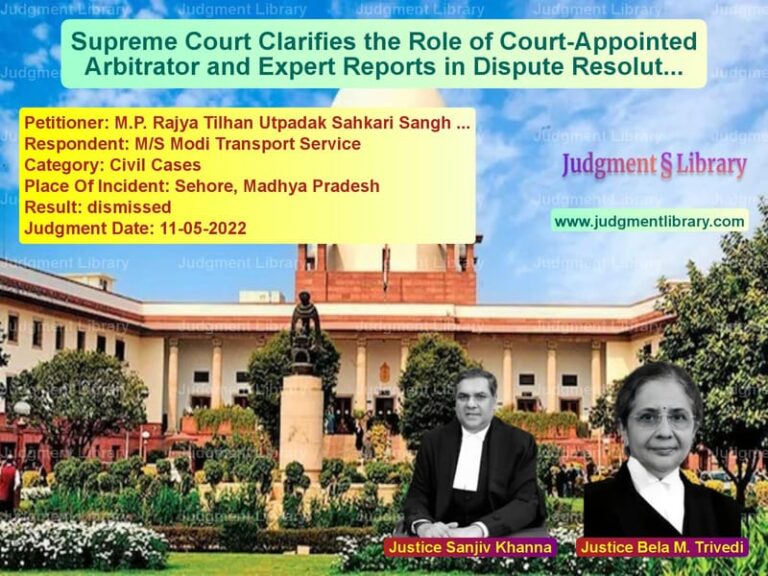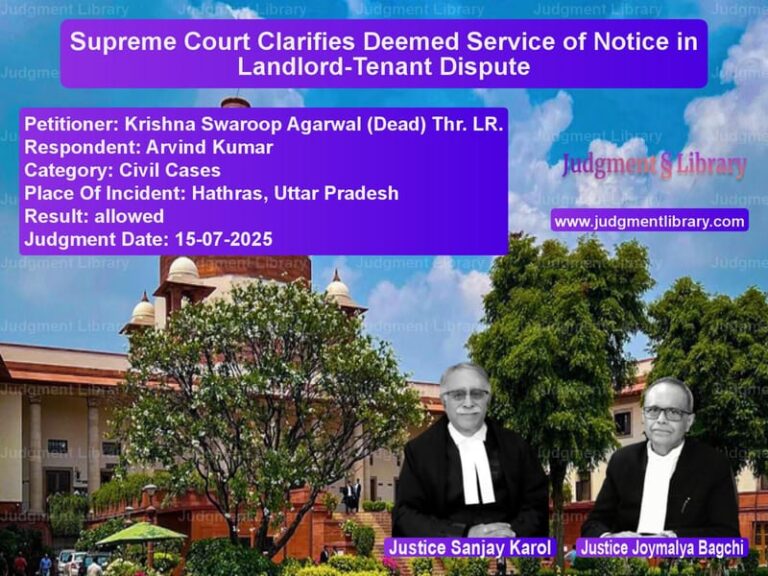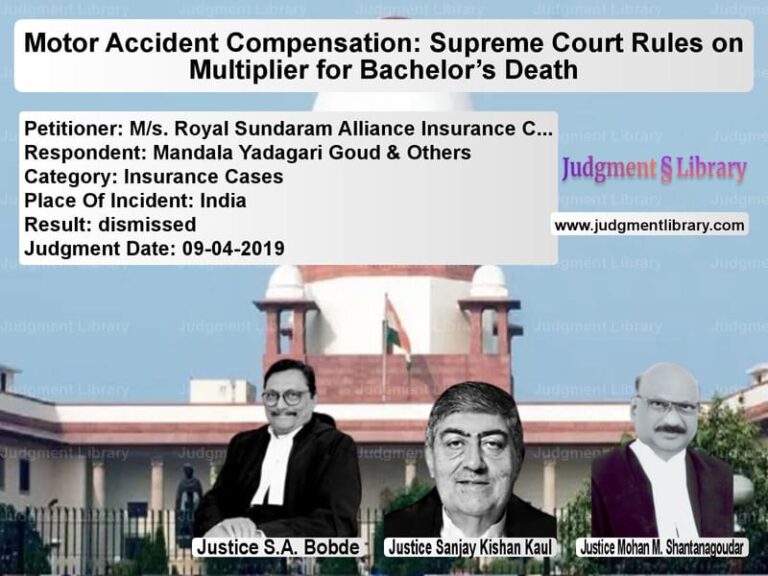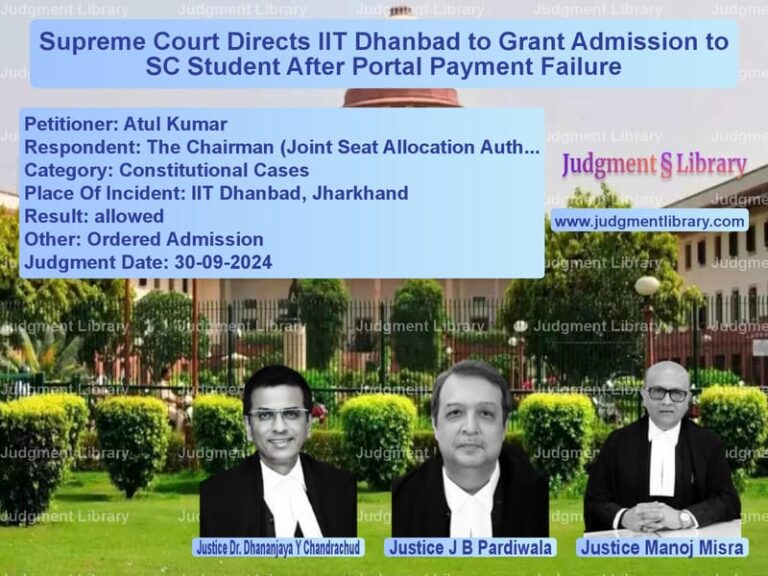Supreme Court Upholds Seniority Rules for Direct Recruits and Promotees in Maharashtra Forest Department
The Supreme Court of India has delivered a significant ruling in the long-standing dispute over seniority between direct recruits and promotees for the post of Assistant Conservator of Forest (ACF) in Maharashtra. The judgment, in the case of Ashok Ram Parhad & Ors. vs. The State of Maharashtra & Ors., clarified that direct recruits can claim seniority only from the date of appointment after completion of training, and not from the date of commencement of training. This ruling reinforces the established principle that statutory service rules prevail over government resolutions in determining seniority and promotion.
Background of the Case
The case originated from the recruitment process for the post of Assistant Conservator of Forest (ACF) in Maharashtra, which is filled through two sources—direct recruitment and promotion. The recruitment follows a 50:50 ratio between these two categories. The ACF post serves as the feeder cadre to the post of Divisional Forest Officer (DFO).
Read also: https://judgmentlibrary.com/supreme-court-upholds-police-authoritys-discretion-in-recruitment-case/
The appellants, who were appointed as ACFs through direct recruitment in 2016, contested the seniority list, arguing that their training period should be counted as part of their service tenure. On the other hand, respondents, who were promoted to ACF in 2014, claimed that their seniority should be preserved as they assumed charge earlier than the direct recruits.
Litigation History
The Maharashtra Public Service Commission (MPSC) issued an advertisement for recruitment of ACFs through the Maharashtra Forest Service Examination in 2012. The selection process concluded in 2013, but instead of issuing appointment orders, the state government directed the selected candidates to undergo pre-appointment training starting February 1, 2014.
The direct recruits challenged this decision before the Maharashtra Administrative Tribunal (MAT), seeking recognition of their service from the date of training commencement. The Tribunal ruled in their favor, directing that training should be considered as part of their probation period.
The promotee officers, who had already been appointed as ACFs in 2014, challenged the MAT decision before the Bombay High Court. They contended that their seniority was unfairly impacted by the ruling. The High Court ruled in favor of the promotees, holding that under the applicable rules, direct recruits could claim seniority only after their training period was completed.
Aggrieved by the High Court’s decision, the direct recruits approached the Supreme Court.
Arguments by the Appellants (Direct Recruits)
- The appellants argued that their selection process was completed in 2013, and they should be considered as appointed ACFs from the date of their training commencement in 2014.
- They relied on a Government Resolution dated 2017, which stated that the training period should be counted as regular service for all purposes, including seniority.
- The appellants contended that Rule 6 of the Maharashtra Forest Service Rules, 1998, supported their claim that training should be treated as probation.
- They argued that excluding the training period from service tenure unfairly disadvantaged them in seniority rankings.
Arguments by the Respondents (Promotees and State of Maharashtra)
- The promotees contended that under Rule 3(b) and Rule 6 of the 1998 Rules, direct recruits were required to complete training before being formally appointed as ACFs.
- They relied on the Proviso to Rule 2 of the Divisional Forest Officer (Recruitment) Rules, 1984, which explicitly states that training and probation periods should not be counted towards the requisite period of service.
- The promotees argued that they had been performing duties as ACFs since their promotion in 2014, and it would be unfair to rank them junior to officers who completed training only in 2016.
- They cited previous Supreme Court judgments, such as Prafulla Kumar Swain v. Prakash Chandra Misra, which held that direct recruits can claim seniority only from the date of formal appointment and not from the date of recruitment or training.
Supreme Court’s Observations and Ruling
The Supreme Court upheld the decision of the High Court, ruling that direct recruits cannot claim seniority from the date of commencement of training. The Court emphasized the following points:
- The Proviso to Rule 2 of the 1984 Rules clearly states that training and probation periods shall not be counted towards the requisite period of service.
- Rule 3(b) of the 1998 Rules requires direct recruits to successfully complete training before being appointed as ACFs.
- While the Government Resolution of 2017 allowed the training period to be counted as service for pay and benefits, it did not override the statutory service rules governing seniority.
- The promotees had already been discharging the duties of ACFs before the direct recruits completed their training, justifying their seniority.
The Supreme Court held:
“In service jurisprudence, statutory rules take precedence over government resolutions. The Proviso to Rule 2 of the 1984 Rules explicitly excludes training periods from service tenure. Seniority cannot be granted retrospectively from the date of training commencement.”
Final Judgment
The Supreme Court dismissed the appeals and ruled:
- The seniority of direct recruits shall be counted from the date of their formal appointment after training completion.
- The Government Resolution of 2017 does not override the statutory rules on seniority.
- The promotees shall retain their seniority as they had been appointed to the ACF post before the direct recruits completed their training.
- The Maharashtra government must adhere to the statutory framework while determining seniority in future recruitments.
Implications of the Judgment
This ruling has significant implications for service jurisprudence and inter-se seniority disputes:
- Statutory Rules Prevail: The judgment reinforces the principle that service rules framed under Article 309 of the Constitution prevail over administrative orders or resolutions.
- Clear Precedent for Seniority Determination: Ensures that direct recruits cannot claim seniority from the date of training commencement unless explicitly provided in service rules.
- Equity Between Promotees and Direct Recruits: Protects the legitimate expectations of promotees who have already assumed charge of their posts.
- Policy Clarity: Directs state governments to align their policies with statutory provisions to prevent unnecessary litigation.
Conclusion
The Supreme Court’s ruling in Ashok Ram Parhad & Ors. vs. The State of Maharashtra & Ors. provides much-needed clarity in the long-standing debate over inter-se seniority between direct recruits and promotees. The judgment upholds the sanctity of statutory service rules, ensuring that seniority is determined based on clear legal provisions rather than administrative resolutions. This decision will serve as a guiding precedent for future service disputes across various government departments.
Petitioner Name: Ashok Ram Parhad & Others.Respondent Name: State of Maharashtra & Others.Judgment By: Justice Sanjay Kishan Kaul, Justice Abhay S. Oka.Place Of Incident: Maharashtra.Judgment Date: 14-03-2023.
Don’t miss out on the full details! Download the complete judgment in PDF format below and gain valuable insights instantly!
Download Judgment: ashok-ram-parhad-&-o-vs-state-of-maharashtra-supreme-court-of-india-judgment-dated-14-03-2023.pdf
Directly Download Judgment: Directly download this Judgment
See all petitions in Promotion Cases
See all petitions in Recruitment Policies
See all petitions in Public Sector Employees
See all petitions in Judgment by Sanjay Kishan Kaul
See all petitions in Judgment by Abhay S. Oka
See all petitions in dismissed
See all petitions in Declared Infructuous
See all petitions in supreme court of India judgments March 2023
See all petitions in 2023 judgments
See all posts in Service Matters Category
See all allowed petitions in Service Matters Category
See all Dismissed petitions in Service Matters Category
See all partially allowed petitions in Service Matters Category







